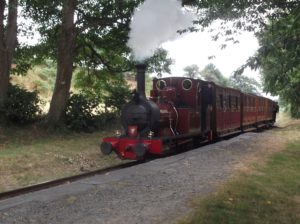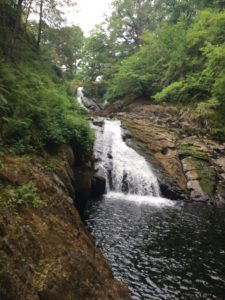
This is the reason we went to Wales – the narrow gauge railways. This one is the Tallyllyn woodland trail, a very pleasant trip. We did two railways, three castles, two historic houses, and three waterfalls, including the Swallow Falls at Betws y Coed.

We also visited Ty Mawr Wybrnant, a sixteenth century drovers’ inn, where the Bishop William Morgan was born, who made the first translation of the Bible into Welsh.

This was significant, partly because it halted the attempt to downgrade Welsh as a recognised spoken language, but more crucially, as local variations developed, it provided a standard for written Welsh, enabling the teaching of the language across the whole country. Many visitors now present the Museum with a copy of the Bible in their own language, and the collection is now quite large, providing for many a record of the first time the language was written down.

We had a very interesting conversation about Welsh with the custodian here, as I’d already noticed a huge increase in the amount of Welsh I heard spoken in the streets and shops. When I used to visit Wales as a teenager, you would hear Welsh as you might hear Scottish Gaelic now, among the old, the isolated communities and the enthusiasts. But in North Wales now you hear Welsh more often than English, among young families, among teenagers out shopping, between the generations.
The custodian told us that all primary schools now teach in Welsh as a first language, and there are immersion courses for non Welsh-speaking children to enable them to join in within three months, which have a high success rate. Similar courses are available to adults, free of charge, and there is a high demand for them. The payoff is visible in the bookshops. Two thirds of the books on offer in the indie bookshops are from Welsh publishers, or by Welsh authors, and half of them are in Welsh.
You might wonder if this would isolate children from mainstream culture, but it would seem not. The aim is to have children fluent in Welsh and English and with significant experience of French and Spanish by the age of eleven. Once you can move out of the cultural assumptions of a monoglot culture, the world would appear to be wide open.
This must have implications for Scotland. Of course it’s not the same – Gaelic isn’t the only indigenous language that has been overshadowed by the dominance of English, and I’ve seen a lot of vitriol thrown about as if Gaelic and Scots were mutually exclusive, and as if teaching one was threatening to the other. Plus, there are communities with distinctive history and culture which might be swamped by a too gallus insistence on linguistic orthodoxy. But it’s more complicated because it’s richer. Scotland has so many treasures of languages and art forms – the Welsh initiative shows there’s a chance we could have them all.
Leave a Reply